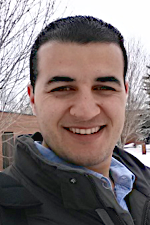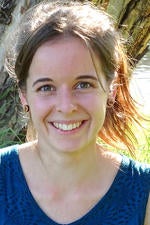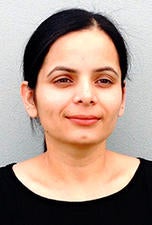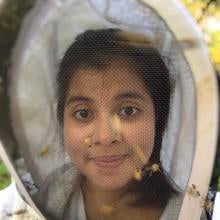Name: Prof. Boris Baer (SEE CV)
Research: We identify molecules linked to bee health and study their functioning, which allows us to understand complicated biological processes such as for example the complex interactions between bees and their parasites. We are also conducting field research to unravel how environmental stress impacts health related proteomes or trigger colony collapses. Our research on the reproductive biology of bees looks for opportunities to identify and breed bees that are better able to cope with environmental stress.
Expertise: Sociobiology, Evolutionary biology, Sexual selection, Proteomics
Publications: Website, Google Scholar, ResearcherID, ORCID
Contact me: boris.baer@ucr.edu
Name: Barbara Baer-Imhoof
Function: Co-director of CIBER
Research: I am co-lead of a project funded by the Keck Foundation to find a Rosetta stone to unravel the language of bees. To do this, I use volatile odors to compare how different genotypes of bees process and communicate stress.
Outreach & Extension: I organize the Annual Bee Health Conference for 120 attendees, and I coordinate outreach and extension activities, including presentations and stalls at different events.
Expertise: Evolutionary Biology, Project Management
Publications: https://scholar.google.com.au/citations?user=nGXk0R8AAAAJ&hl=en
Contact me: barbarai@ucr.edu
Name: Yahya Al Naggar
Function: Postdoctoral Fellow
Research: I'm interested to unravel the causes of colony collapse disorder (CCD). I'm conducting lab and field experiments to test whether novel insecticides that are targeting the nicotinic acetylcholine receptor of insects are also harmful to honeybees and their interactions with other environmental stressors. Such knowledge is key for future pollinator health management and key to safeguard food security into the future.
Expertise: Pesticides, Toxicology, Bee Biology, Social Immunity, Molecular Toxicology
Publications: Google Scholar, Orcid, Research gate
Contact me: yalnagga@ucr.edu or Yehia.elnagar@science.tanta.edu.eg
Name: Madlen Kratz
Function: PhD student
Research:I am interested to unravel the impact that honeybee nutrition has and colony health. In particular, I am interested in whether the availability of different floral resources could help as a novel bee health management tool, especially during times when honeybees are used for commercial crop pollination. To quantify such beneficial effects of nutrition on colony health, I measure their effects on immunity and disease susceptibility, as well as the longevity of pollinating bees and their efficiency to pollinate agricultural crops.
Expertise: Honeybee nutrition, Antmicrobial honey, Pollination, Immunity, Nosema
Publications: click here
Contact me: kratzm01@student.uwa.edu.au
Name: Kamal Brar
Function: PhD student
Research: I am interested to understand the molecular relationship between the honeybee immune system and one of the most widespread bee pathogens, the fungus Nosema apis. To do this I investigate whether different genotypes of bees differ in their level of resistance against different strains of Nosema. Such knowledge would allow to set up a molecularly informed breeding program to increase disease tolerance in manager honeybee stock.
Expertise: Host Parasite Interactions, Proteomics, Genomics, Honeybee Immunity
Publications:
Contact me: kamalpreet.brar@research.uwa.edu
Name: Daniel Leontieff
Function: Research Student
Research: I am interested in combining my engineering skills with modern beekeeping practices to develop new technologies to monitor honeybees and their colonies. To do this, I am looking into to use various devices and sensors that can remotely monitor key parameters related to bee health. Using such data, I am specifically interested to analyze responses of honeybees to environmental stress and use such knowledge for prediction models that can identify early and critical signs of declining colony performance. Remote sensing of honeybee hives would offer uniquely new opportunities to manage bee health in the future.
Expertise: Remote sensors, Honeybee Health, Colony Collapse
Publications:
Contact me: dleon010@ucr.edu
Name: Ghislaine Small
Function: PhD student
Research: I am interested in the gut bacteria of Western Australian endemic termites and how they break down cellulose from plants. I use metagenomics to sequence the natural microbial population in the gut and follow any changes in the community linked to colony, diet or location. There is a potential application in the production of biofuels, cleaner, renewable sources of energy.
Expertise: Microbiology, Genetics, Sequencing, Metagenomics, Termites
Contact me: ghislaine.small@research.uwa.edu.au
Name: Genesis Chong
Function: PhD student
Research: I am a PhD candidate interested in the underlying mechanisms that survival honey bees use to defend themselves against Varroa mite. My research aims to establish a molecular breeding program focusing on honey bee health. I have an interest in host-parasite interaction, tolerance, immunity, Africanized honey bees, and defensive mechanisms.
Expertise: Nosema, Africanized honeybees, Host - Parasite Interactions
Publications:
Contact me: gchon004@ucr.edu






